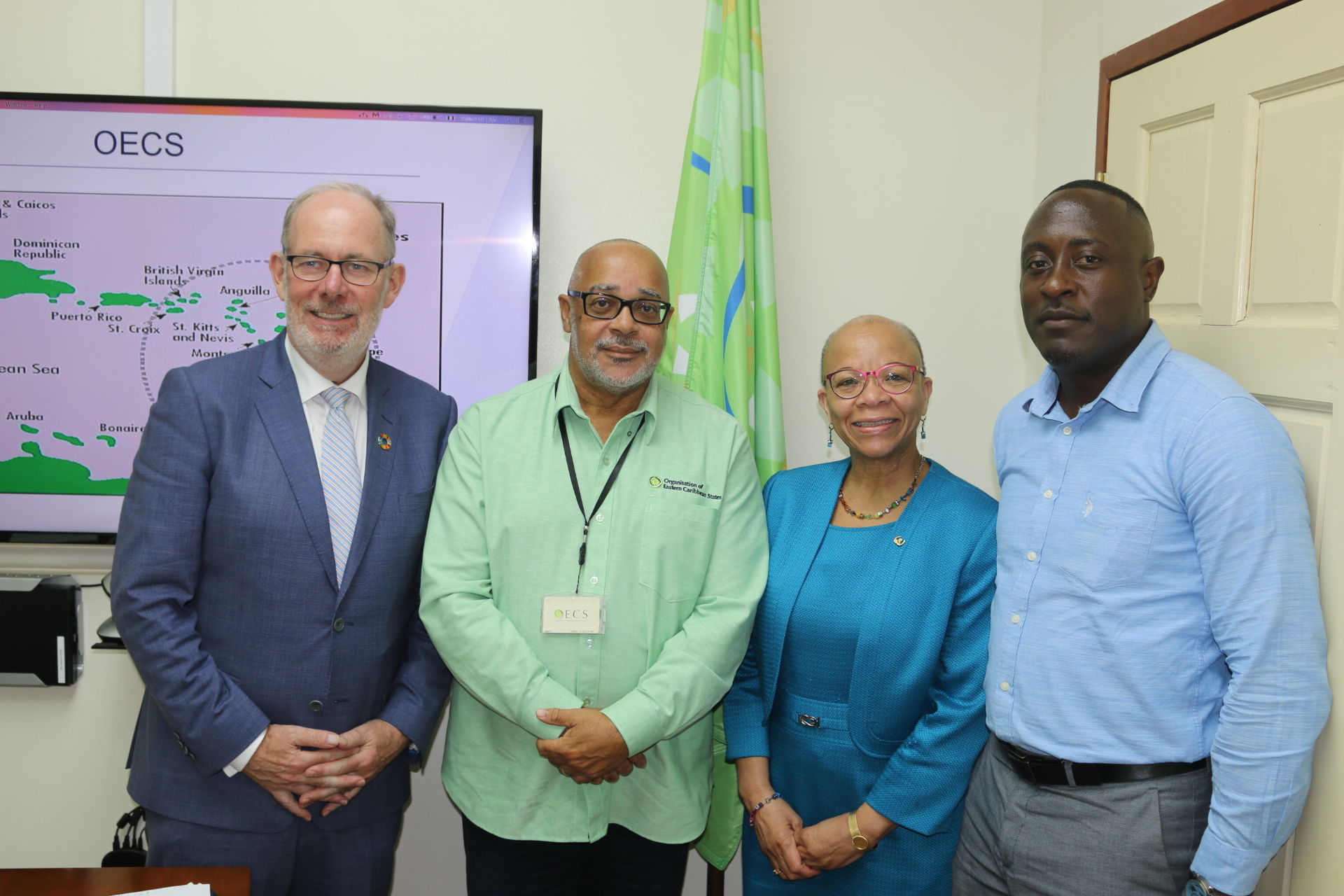Strengthening capacities to address marine debris and sargassum in the Eastern Caribbean
OECS Media Release
The President of the World Maritime University (WMU) Dr. Cleopatra Doumbia-Henry, accompanied by the Director of WMU-Sasakawa Global Ocean Institute, and Nippon Foundation Professorial Chair, Professor Ronan Long, paid a courtesy call on the Director General of the Organisation of Eastern Caribbean States (OECS) Dr. Didacus Jules on January 27, 2020.
In the main, the meeting centered on cooperation in the area of ocean space preservation in the Eastern Caribbean.
Dr. Jules used the opportunity to apprise the President of the World Maritime University of the Caribbean Regional Ocean Policy (CROP). The USD 6.3 million project funded by the World Bank is dedicated to the promotion of the blue economy in the Caribbean, mainly in five OECS Member States: the Commonwealth of Dominica, Grenada, St. Kitts and Nevis, Saint Lucia, and St. Vincent and the Grenadines.
Professor Long also presented the WMU-Nippon-Foundation Marine Debris and Sargassum ‘Closing the Circle’ Programme. The three-year research programme aims to develop practical solutions to the challenges posed by marine debris and sargassum in the Eastern Caribbean region.
Dr. Jules further expressed enthusiasm on the recently concluded partnership between the OECS and the WMU stating
“The OECS Environmental Sustainability Cluster has done a remarkable job in persuading the World Bank to support the Eastern Caribbean Regional Oceanscape Project (ECROP). All the studies carried out by the World Bank show very optimistic projections on the blue economy. However, unless we have the infrastructure and the capability of leveraging our ocean space, they will remain projections. In this context, we are looking forward to collaborating with a center of excellence in ocean education like the WMU, which has maintained international recognition over the years,” Dr. Jules said.
President of the WMU Dr. Cleopatra Doumbia-Henry noted:
“Over the past 37 years, the WMU has educated over 5,100 individuals from 170 countries to be the stewards of the sea and to chart the course for a better world. Our mandate includes empowering both maritime and ocean leaders particularly from developing countries. Hence, the collaboration with the OECS Member States will be a major step towards enhancing ocean education and preservation in the Eastern Caribbean region.”
Both entities indicated their will to formalise the agreement through a Memorandum of Understanding to promote the WMU-Nippon-Foundation Marine Debris and Sargassum ‘Closing the Circle’ Programme, and facilitate access to scholarship opportunities for Nationals of the OECS.
Applications to participate in the research programme are now open and are accessible through https://www.wmu.se/phd/apply until March 8, 2020.
Three (3) PhD candidates from the Eastern Caribbean will be selected to participate in the programme.
For further information, please contact Professor Ronan Long at: goisecretariat@wmu.se
About the World Maritime University (WMU)
The World Maritime University was founded in 1983 by the International Maritime Organization (IMO), a specialized agency of the United Nations, as its premier centre of excellence for maritime postgraduate education, research, and capacity building. The University offers unique postgraduate educational programmes, undertakes wide-ranging research in maritime and ocean-related studies, and continues maritime capacity building in line with the UN Sustainable Development Goals. The WMU has a network of 5156 alumni from 170 countries.
About the Caribbean Regional Oceanscape Project (ECROP)
On October 14, 2017, a Grant Agreement for the Caribbean Regional Oceanscape Project (CROP) was signed between the OECS and the International Bank for Reconstruction and Development, acting as an Implementing Agency of the Global Environment Facility.
The relating grant is USD 6.3 million and for the benefit of five participating Member States, namely: the Commonwealth of Dominica, Grenada, St. Kitts and Nevis, Saint Lucia, and St. Vincent and the Grenadines. The main objective of the project is to strengthen ocean governance in participating states.

 From left to right: Head of the OECS Environmental Sustainability Cluster Chamberlain Emmanuel, OECS Coordinator for Ocean Governance and Fisheries David Robin, Director General of the Organisation of Eastern Caribbean States (OECS) Dr. Didacus Jules, President of the World Maritime University (WMU) Dr. Cleopatra Doumbia-Henry and Director of WMU-Sasakawa Global Ocean Institute, and Nippon Foundation Professorial Chair, Ocean Governance & Law of the Sea, Professor Ronan Long.
From left to right: Head of the OECS Environmental Sustainability Cluster Chamberlain Emmanuel, OECS Coordinator for Ocean Governance and Fisheries David Robin, Director General of the Organisation of Eastern Caribbean States (OECS) Dr. Didacus Jules, President of the World Maritime University (WMU) Dr. Cleopatra Doumbia-Henry and Director of WMU-Sasakawa Global Ocean Institute, and Nippon Foundation Professorial Chair, Ocean Governance & Law of the Sea, Professor Ronan Long.


